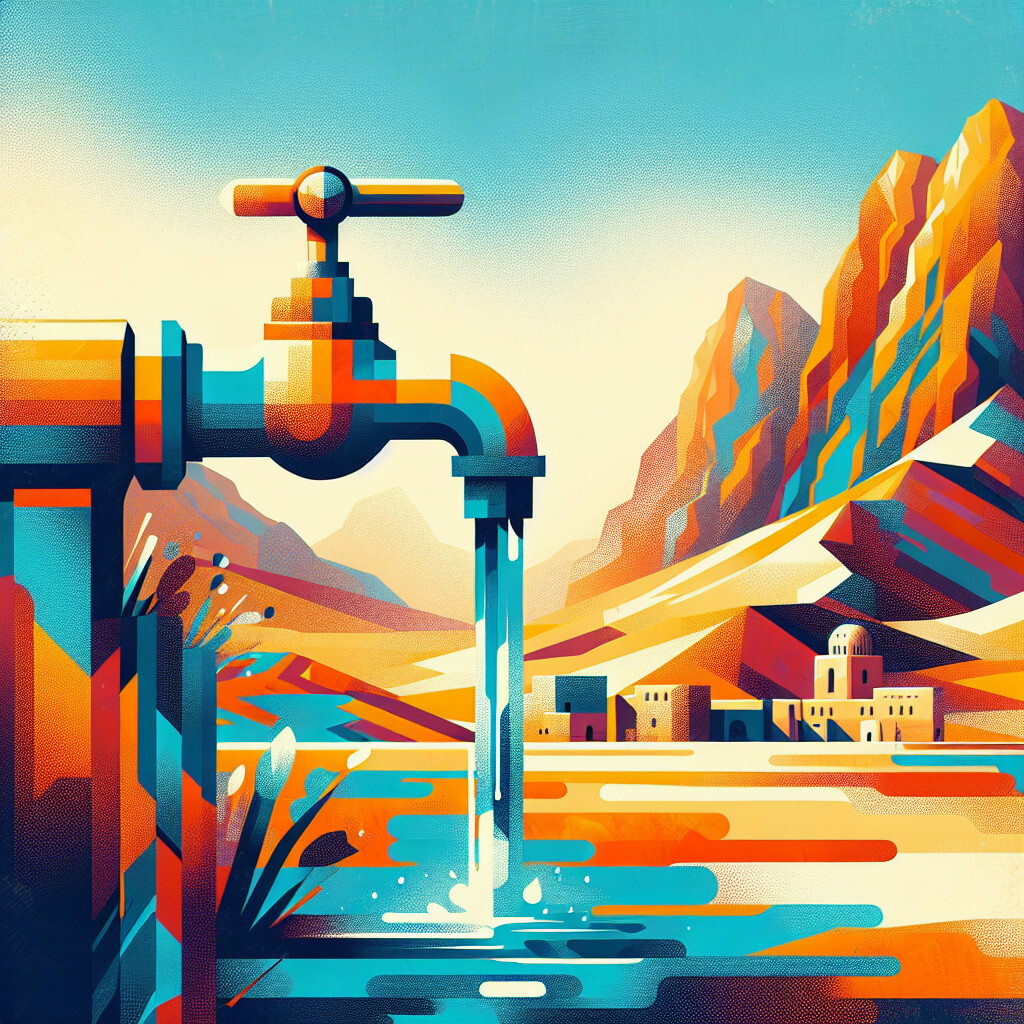-
Table of Contents
“Oman’s Tap Water: Pure, Safe, and Ready to Quench Your Thirst!”
Introduction

The tap water in Oman is generally safe to drink as it meets the World Health Organization standards for potable water. It is primarily sourced from desalination plants, underground wells, and imported via pipelines. However, due to the high mineral content resulting from the desalination process, many locals and expatriates prefer to drink bottled water or use water filtration systems. The taste of the tap water can also vary depending on the location within the country.
Understanding the Quality of Tap Water in Oman
The Sultanate of Oman, a country known for its rich history, diverse culture, and stunning landscapes, is also recognized for its efforts in providing clean and safe tap water to its residents. The quality of tap water in Oman is a topic of interest for many, particularly those planning to visit or relocate to the country. This article aims to provide an understanding of the quality of tap water in Oman, shedding light on its sources, treatment processes, and safety standards.
Oman’s tap water primarily originates from two sources: desalinated seawater and underground wells. The country’s geographical location, surrounded by the Arabian Sea and the Gulf of Oman, makes desalination a viable option. Desalination plants, using advanced technology, convert seawater into potable water, which is then supplied to households and businesses. On the other hand, underground wells, found mainly in the interior regions, provide fresh water that is naturally filtered through layers of rock and soil.
The treatment process of tap water in Oman is stringent and adheres to international standards. The Public Authority for Water (Diam) is responsible for the supply of potable water in the country. The water undergoes a rigorous purification process, including filtration, disinfection, and reverse osmosis, to remove any impurities and harmful substances. The treated water is then tested for quality before it is distributed to consumers.
The quality of tap water in Oman is monitored and regulated by the Ministry of Health. The ministry conducts regular inspections and tests to ensure that the water meets the World Health Organization’s (WHO) guidelines for drinking water quality. These guidelines specify the acceptable limits for various physical, chemical, and microbiological parameters in drinking water. The tests conducted by the ministry include checking for harmful bacteria, heavy metals, and chemical contaminants. The results of these tests have consistently shown that the tap water in Oman is safe for consumption.
Despite the high quality of tap water, many residents in Oman prefer to drink bottled water or use water filtration systems at home. This preference is often driven by taste rather than safety concerns. The desalination process can sometimes leave a slight salty taste in the water, which some people find unpalatable. However, this does not indicate a problem with the water’s safety or quality.
In conclusion, the tap water in Oman is generally safe to drink, thanks to the country’s robust water treatment processes and strict regulatory oversight. The government’s commitment to providing clean and safe water to its residents is evident in its investment in advanced water treatment technologies and regular quality checks. However, it is always advisable for visitors and new residents to take some time to acclimatize to the local water or opt for bottled water if they find the taste of tap water unfamiliar. As with any aspect of health and wellbeing, it is essential to stay informed and make choices that best suit individual preferences and needs.
The Role of Desalination in Oman’s Tap Water Supply
Oman, a country located on the southeastern coast of the Arabian Peninsula, is known for its rich history, diverse culture, and stunning landscapes. However, one aspect of life in Oman that often goes unnoticed is the quality of its tap water. Given the country’s arid climate and limited freshwater resources, the provision of clean, safe drinking water is a significant challenge. This is where the role of desalination, a process that removes salt and other impurities from seawater, becomes crucial in Oman’s tap water supply.
Desalination is not a new concept in Oman. The country has been relying on this technology for several decades to meet its growing water needs. The first desalination plant in Oman was established in the 1970s, and since then, the country has made significant strides in expanding its desalination capacity. Today, Oman is home to some of the world’s largest and most advanced desalination facilities, which collectively produce hundreds of millions of cubic meters of fresh water each year.
The desalination process in Oman primarily involves two methods: reverse osmosis and multi-stage flash distillation. Reverse osmosis is a technique that uses a semi-permeable membrane to separate salts from water. On the other hand, multi-stage flash distillation involves heating seawater to create steam, which is then condensed to produce fresh water. Both methods are highly effective in removing impurities and producing water that is safe for human consumption.
The quality of tap water in Oman is closely monitored by the Public Authority for Water (Diam), which sets stringent standards for water quality and regularly conducts tests to ensure these standards are met. The water produced by desalination plants is treated with chemicals to kill any remaining bacteria or viruses, and minerals are added to make the water healthier and improve its taste. As a result, the tap water in Oman is generally considered safe to drink, although some residents prefer to use bottled water or water filters for additional peace of mind.
However, desalination is not without its challenges. The process is energy-intensive and contributes to greenhouse gas emissions, which is a concern for a country like Oman that is committed to reducing its carbon footprint. Furthermore, the brine byproduct of desalination can harm marine ecosystems if not properly managed. To address these issues, Oman is investing in research and development to make desalination more sustainable. This includes exploring renewable energy sources to power desalination plants and developing technologies to minimize the environmental impact of brine disposal.
In conclusion, desalination plays a vital role in Oman’s tap water supply. Despite the country’s harsh climate and scarce freshwater resources, the use of advanced desalination technologies ensures that residents have access to clean, safe drinking water. While there are environmental challenges associated with desalination, Oman is taking proactive steps to address these and ensure the sustainability of its water supply for future generations. Therefore, whether you’re a resident or a visitor, you can feel confident about the quality of tap water in Oman.
Health Implications of Drinking Tap Water in Oman
In the Sultanate of Oman, a country known for its rich history and diverse landscapes, the quality of tap water is a topic of considerable interest. This is particularly true when considering the health implications of consuming this vital resource. The quality of tap water can significantly impact the health of the population, and in Oman, this is a matter that has been given considerable attention.
Oman, like many other countries in the Middle East, faces challenges related to water scarcity. The country relies heavily on desalination plants and underground wells for its water supply. The water from these sources is treated and purified before it is supplied to households as tap water. The Public Authority for Water in Oman (Diam) ensures that the water supplied meets the World Health Organization’s (WHO) guidelines for drinking water quality.
However, despite the rigorous treatment processes, there are still concerns about the quality of tap water in Oman. One of the primary concerns is the high level of salinity. The desalination process does not entirely remove the salt content from the water. Consuming water with high salinity over a prolonged period can lead to health issues such as high blood pressure and kidney problems.
Another concern is the presence of harmful microorganisms. While the water treatment process is designed to eliminate these, there is a risk of contamination during the distribution process. This could potentially lead to waterborne diseases. Therefore, it is recommended to boil tap water before consumption, especially for those with compromised immune systems.
Furthermore, the quality of tap water can also be affected by the condition of the water supply infrastructure. In some older areas of Oman, the water supply pipes are outdated and may contribute to the contamination of the water. The presence of heavy metals such as lead in the water due to corrosion of pipes is a serious health concern. Lead exposure can lead to a range of health problems, from cognitive impairment in children to cardiovascular issues in adults.
Despite these concerns, it is important to note that the tap water in Oman is generally safe for everyday use such as bathing and cleaning. However, for drinking and cooking, many residents prefer to use bottled water or install water filtration systems in their homes. These methods provide an extra layer of protection against potential contaminants.
The Omani government is aware of these issues and has been taking steps to address them. There are ongoing efforts to upgrade the water supply infrastructure and improve the water treatment process. The government is also investing in research to explore more sustainable and efficient methods of water desalination.
In conclusion, while the tap water in Oman meets the WHO guidelines for drinking water quality, there are valid concerns about its salinity levels, potential microbial contamination, and the presence of heavy metals. These factors can have significant health implications if the water is consumed without further treatment. Therefore, it is advisable for residents to take additional precautions such as boiling the water, using bottled water, or installing water filtration systems. At the same time, the efforts by the Omani government to improve the water quality are a positive step towards ensuring the health and well-being of the population.
Comparative Analysis: Tap Water in Oman vs Other Gulf Countries
In the realm of water quality, Oman stands as a beacon of excellence among the Gulf countries. The Sultanate has made significant strides in ensuring the provision of safe and clean tap water to its residents. This article aims to provide a comparative analysis of the quality of tap water in Oman versus other Gulf countries.
Oman’s tap water is primarily sourced from desalinated seawater, underground wells, and treated wastewater. The government has invested heavily in state-of-the-art desalination plants and water treatment facilities to ensure the water’s safety and cleanliness. The Public Authority for Water (Diam) is responsible for the management and distribution of water in Oman. They adhere to strict quality control measures, conducting regular tests to ensure that the water meets the World Health Organization’s (WHO) standards for potability.
In comparison, other Gulf countries also rely heavily on desalinated water due to the region’s arid climate and lack of freshwater resources. However, the quality of tap water varies significantly across these countries. For instance, while the tap water in the United Arab Emirates is safe to drink, many residents prefer to consume bottled water due to taste preferences. Similarly, in Saudi Arabia, despite the government’s assurance of the tap water’s safety, the public often opts for bottled water due to concerns about water quality.
In contrast, Kuwait’s tap water, despite being safe to drink, has been reported to have a salty taste due to the high level of minerals present in the water. This has led to a high reliance on bottled water among the residents. Bahrain, on the other hand, has faced criticism for its tap water quality, with reports of contamination and irregularities in water treatment processes.
Qatar, like Oman, has made significant investments in its water infrastructure. The tap water is safe to drink, and the country has one of the lowest percentages of water-borne diseases in the region. However, similar to other Gulf countries, the public perception of tap water safety is low, leading to a high consumption of bottled water.
In terms of water sustainability, Oman has taken a proactive approach. The government has implemented several water conservation measures, such as the use of modern irrigation techniques in agriculture and the promotion of water-saving practices among the public. This is in stark contrast to countries like Saudi Arabia, where water scarcity is a significant issue due to high consumption rates and inefficient water use.
In conclusion, while the quality of tap water varies across the Gulf countries, Oman stands out for its commitment to providing safe and clean water to its residents. The country’s investment in water infrastructure, strict quality control measures, and water conservation efforts are commendable. However, it is crucial for all Gulf countries to address the public’s perception of tap water safety and promote the use of tap water over bottled water to ensure water sustainability in the region.
Q&A
1. Question: Is tap water in Oman safe to drink?
Answer: Tap water in Oman is generally safe to drink as it meets the World Health Organization standards. However, most locals and expats prefer to drink bottled water or use water filtration systems due to taste preferences.
2. Question: What is the source of tap water in Oman?
Answer: The primary source of tap water in Oman is desalinated seawater, groundwater, and a small percentage is imported.
3. Question: How is the quality of tap water in Oman?
Answer: The quality of tap water in Oman is generally good as it undergoes rigorous purification and desalination processes. However, the taste may differ due to the high mineral content.
4. Question: Are there any common issues with tap water in Oman?
Answer: There are no major issues with tap water in Oman. However, the high mineral content due to the desalination process can sometimes lead to a different taste, which is why some people prefer bottled water.
Conclusion
The tap water in Oman is generally safe to drink as it meets the World Health Organization standards. However, due to the high mineral content, many residents and visitors prefer to drink bottled water or use a filtration system.






